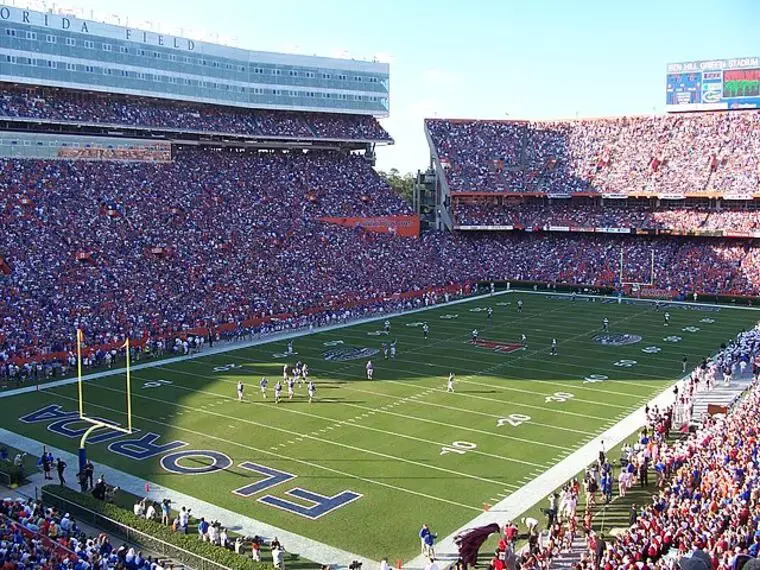In football, “home-field advantage” has long been considered a critical factor in determining who wins or loses.
Now, science is shedding some light on this phenomenon, challenging some long-held beliefs and offering a unique perspective on sports’ psychological aspects and the spectators’ profound impact.
Marked by twinkling lights and festive melodies, for most people, December marks the start of the holiday season, representing a time for joy, celebrations, and the spirit of giving.
However, for millions of football fans, this time of year can also resonate with a different kind of excitement and anticipation.
For football fans, this marks the pivotal closing weeks of the NFL season, with teams vying for a spot in the playoffs and the gritty battle to get to the Super Bowl. On the collegiate side of the ball, teams are gearing up for their much-anticipated bowl appearances or, if they’re lucky, a spot in the College Football Playoff National Championship.
Long heralded as an “American sport” but quickly gaining traction as an international sensation, football showcases the palpable excitement of home games, where crowds of nearly 100k roaring fans seemingly fuel the performance of their beloved teams.
But does this fan presence translate to a tangible home-field advantage?
A recent study delving into historical National Football League (NFL) data, especially during the COVID-19 pandemic, provides empirical evidence to this age-old debate.
The study, led by researchers Dávid Zoltán Szabó from Corvinus University of Budapest and Diego Andrés Pérez Ruiz from The University of Manchester, utilized data from NFL games dating back to 1970.
Researchers specifically honed in on the seasons affected by the COVID-19 pandemic, offering a unique opportunity to assess games played without or with significantly reduced fan presence.
The findings offer some intriguing insights into the concept of home-field advantage and the psychological impact fans have on those playing the game.
Researchers found that home teams performed noticeably poorer than usual when no spectators were allowed. Surprisingly, however, the home teams’ performance significantly increased, provided they at least had a limited audience.
The results showed that home-field advantage in football is a real “thing.” However, the size of the home crowd is irrelevant, suggesting that a fraction of regular fans could induce the psychological edge typically associated with full stadiums.
The research employed rigorous statistical methodologies, including binomial distributions for game outcomes and normal distributions for score differences. Confidence intervals and Z-tests additionally supported the findings, underscoring the impact of fan presence on home team performance.
Researchers concluded that the concept of home-field advantage appears entirely driven by “psychological concepts,” including a self-perpetuating belief in its existence among players.
“Our study reveals that when allowing only up to 25% of spectators, the home team performance is no longer significantly different compared to normal circumstances,” researchers wrote. “These findings suggest that the only relevant causes that explain general home team advantage are crowd effects, referee bias, and psychological factors.”
Conversely, the absence of fans, like during the 2020 season impacted by the COVID-19 pandemic, can lead to confusion among players, eroding the usual psychological edge of home-field advantage.
Coincidently, teams playing in front of a crowdless stadium can also negatively impact fans’ willingness to watch games on television.
During the 2020 pandemic, when most professional sports were forced to play in empty venues, the NFL, NBA, NHL, and MLB all suffered double-digit declines in domestic TV viewership.
Several networks used AI-generated sound effects and computer-generated imagery (CGI) to simulate crowds in their telecasts to compensate for the seas of empty seats. These attempts were generally met with negativity, with some fans saying they were “psychologically annoyed” at the prospect of watching cheers from fake CGI crowds.
This recent study offers some insights into the factors that translate into home-field advantage and team sports’ psychological dynamics.
However, to the chagrin of die-hard fans and season ticket holders, when comparing research findings with team performance records, the study also inadvertently suggests fans have minimal impact on the overall outcomes of games.
As of week 15 of the 2023 NFL season, the Dallas Cowboys hold the league’s best home records with a perfect 7-0. Coincidentally, the Cowboy’s AT&T Stadium has the highest capacity of any NFL stadium, with over 100,000 spectators.
The NFL’s smallest stadium is FedEx Field, home of the Washington Commanders, with a max capacity of 58,000. The Commanders also have the season’s 2nd worst home record of 1-5.
Of course, this doesn’t refute the researcher’s findings that it isn’t the size of the crowd that creates home-field advantage, so long as there are at least some fans cheering on the home team.
Instead, it demonstrates that while home-field advantage can be a part of it, other, more significant factors ultimately determine the outcome of games. Namely, the performance of the athletes on the field.
This is probably why the average annual salary of an NFL player is $2.8 million. Meanwhile, according to TicketSmart, NFL fans pay, on average, $377 to attend a game.
So, don’t feel bad if you miss a game or two. So long as some of your compatriots show up to offer their support, your favorite team can still maintain home-field advantage.
But even then, home-field advantage alone isn’t enough to stop Patrick Mahomes from going 27/37 for 305 yards and two touchdowns on your hometown favorite. Just ask the Patriots.
A preprint of the study Does home advantage without crowd exist in American football? was published on Arxiv.
Tim McMillan is a retired law enforcement executive, investigative reporter and co-founder of The Debrief. His writing covers defense, national security, and the Intelligence Community. You can follow Tim on Twitter: @LtTimMcMillan. Tim can be reached by email: tim@thedebrief.org or through encrypted email: LtTimMcMillan@protonmail.com

